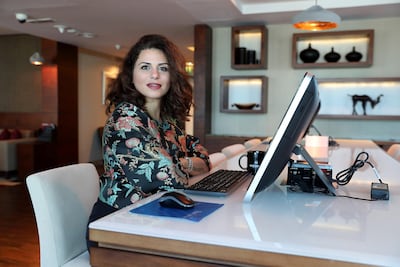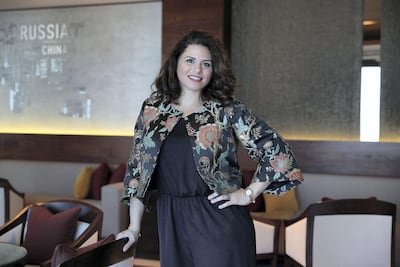Cynthia-Helena Rif is director of operations of co-working membership firm WitWork, which links freelancers and entrepreneurs with under-used spaces in hotels and restaurants.
Formerly Emirates cabin crew, she became executive director to the board of the Canadian Business Council Abu Dhabi, before co-founding WitWork in early 2018. It currently has 35 UAE locations, mostly in partnership with Rotana hotels, and expanding overseas this year.
Ms Rif, 37, from Lebanon, lives near Khalifa Park, Abu Dhabi, with her two sons, aged nine and four, and her husband, Najee, the corporate vice president projects at Rotana Hotels Group.
How did your upbringing shape your attitude towards money?
We grew up during the war so for two years we couldn't live in our house and lived in a dorm at a convent. I have an older brother and sister.
My father was a diplomat in the Portuguese embassy, but had to interrupt a promising career – he couldn’t work in Beirut when war broke out and became an accountant in a paint company, but stayed 30 years to put bread on the table. My mother was a stay-at-home mum.
Maybe at some points we were in need more than we realised, but my mother and father never made us feel we were running out of whatever. Everything had a value. I used to wear a lot of hand-me-downs. I was OK with that, I knew we had to be careful.
Did you work from a young age?
When I was about 10, I did a potato chips commercial. From that I did a few more such as a wafer and a tuna commercial, which paid up to $100 (Dh367) each. My parents saved the money for me, otherwise I’d have splurged. When I was 16/17 I started doing part-time promotion jobs, representing big companies at exhibitions, for about $50 an hour.
My first real job was in my last year at uni at the age of 20, working part-time in a Beirut publishing house selling advertorials for $250 a month.
What brought you to the UAE?
I had a dream of becoming an air hostess. I applied for Emirates and came here in January 2004. After four years I left when I didn't like the lifestyle anymore. I wanted a career. I was 25 and didn't have debts – 70 per cent of cabin crew were living way beyond their means. I got a job as a PR company executive.

How did WitWork happen?
I left the Canadian Business Council and was looking for a job. Co-working was booming. We came across a concept in the US called Spacious [now part of WeWork], where they use under-utilised restaurants and coffee shops usually closed during the day; using real estate already there. We adapted it to the UAE and went down the hotel avenue because we noticed empty spaces. We also have some restaurants in our portfolio.
Is your business more sustainable than the US rival WeWork?
We are very light on assets. Co-working is not a frugal business model if you build a space. We are kind of the Airbnb of co-working; we don’t own spaces so don't have this liability. It’s not only about [individual] membership. We also have meeting rooms and people who have companies but want to get staff out of the office once or twice a month.
How is it cost effective for users?
WitWork is good for people who don't want a [fixed] co-working space - that's sometimes expensive or limited. It’s about flexibility and agility; you have the opportunity to work from any of 35 locations. Around 600 have used our services at different times and we’ve a database of more than 4,000. If you really want to save money, stay home. But you start doing things in your house that prevent you from working.
Are you a spender or a saver?
A bit of both. With Emirates, the first year, I spent most of what I earned but then opened a savings account. With that and my Canadian Business Council end of service gratuity I was able to buy a house in Beirut three years ago. It was a family investment with my brother. We rent it out and that’s income for my parents. You need to start saving from the first job you get.
Have your spending habits changed?
I’m way better than I used to be. I have a big thing about shoes, but I’m not as ecstatic now when I buy fashion. I spend on self development, whether it's a public speaking class or online course. And handmade skincare – I don’t buy mass-produced. I changed my lifestyle three years ago, started realising what I’m putting on and inside my body. I've reached a point where I deserve this.
What do you regret spending on?
I used to buy cheap shoes or clothes. I wish I spent more on quality rather than quantity at the time; instead of buying 10 tops that cost Dh20 I wish I had bought one, Dh500 but really nice that lasted.
What's your most cherished purchase?
Other than the house, I spent a lot travelling with my family while at Emirates [using concession tickets], the five of us. We went to Argentina, India, France … I enjoy every single memory. Also, my dad was in hospital and I was able to pay some bills. I’m proud of that.
How do you save?
My husband is very financially wise, a very good role model. Our investments are mainly real estate; in Lebanon and Canada.We are saving as a family. I’m not saving [directly], but trying not to spend either because we’re financing the business, which is kind of saving.
We don't have over-flowing credit card debts and we don’t live beyond our means. We're not under societal pressure to wear the latest brand, but we make the most of living here. If we want to splurge we're not worried we spent so much that the next two months we’ll just eat cereal.
Are you wiser with money now?
I’ve got wiser, with time, and don’t put myself under temptation like I used to. I shop online, don’t go to the mall anymore. I like good deals and won't buy outside of the sales, unless the kids really, really need shoes.
The fact I was able to buy something as valuable as real estate with my money and could have spent it all on shoes and handbags made me realise [the power of money].
The day we leave the UAE, we will leave with no debts and with savings and investments. We try to instil these values in our children. We don’t like it when they break things or misuse their stuff. We explain to them these are things we’re working hard for.
What would you do if you won Dh1 million?
My mum has been a volunteer for 20 years in a centre for kids with special needs in Lebanon. We’ve donated, but I wish I could do a cheque and say 'for one year, all employees, you’ve got your salaries covered’.
I'm not going to be a hypocrite and say I wouldn’t indulge in something expensive, but I would like to help more. I would also invest some.


